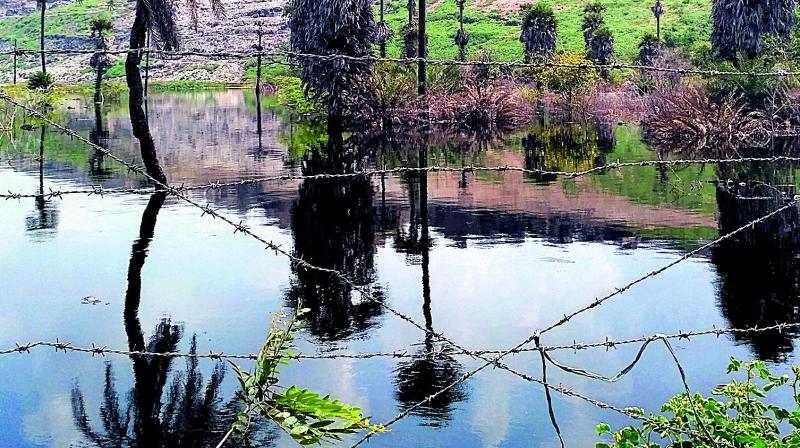Hyderabad's Jawaharnagar dump turns 3 lakes toxic
The 5,000 tonnes of waste that the 100-acre dump yard receives every day is largely made up of garbage that cannot be segregated.

Hyderabad: The Jawaharnagar dump yard has turned into an island amid black oily water. Rainwater seeps into the garbage and collects in pools around the dump yard. While officials say the water has been treated and “normalised”, locals fear that it may be contaminating the groundwater.
Ms Anuradha Yadagiri Goud, the sarpanch of Dammaiguda, downstream of the dumping ground, said, “The black water has contaminated our groundwater. They have let the chemical discharge directly into our lakes.”
There are three lakes within four km radius of the dump yard – Dammaiguda Cheruvu, Nachan Cheruvu and Malkaram Cheruvu – and they have all begun turning black. The residents of Dammaiguda village are forced to rely solely on tap water.
The 5,000 tonnes of waste that the 100-acre dump yard receives every day is largely made up of garbage that cannot be segregated. This includes food waste in polythene bags and mixtures of dry and wet waste. When such waste begins to rot, the organic content releases fluid, which after remaining in contact with metals and plastics for a prolonged period turns into a toxic leachate.
An official of the Ramky Group, which is responsible for the management of the dump yard, said that the release of leachate is a major concern. It is more difficult to handle than the landfill itself because it is a cocktail of heavy metals and chemicals.Mr David M., an official from Ramky, saids “It is toxic and it cannot be released into the environment. However, we treat whatever we can through reverse osmosis.” He adds that 50 per cent of the leachate is sent to solar evaporation ponds located adjacent to the site. Toxic solid chemicals that are left behind is put into a landfill.
While officials claim that the leachate does not enter any water source, the water bodies of the city tell a different tale. The GHMC recently built a canal to divert water between lakes located upstream and downstream without passing through Jawaharnagar.
The dumpsite is surrounded by a number of colonies including Jawaharnagar Gruha, a society for low-income households which houses over 5000 families. Raziya M., a resident of this society, says, “We see waste burn all day, and we have to inhale this muck. When it rains, the black water reaches our homes. I regret buying a home here, but I cannot afford to move now.”

